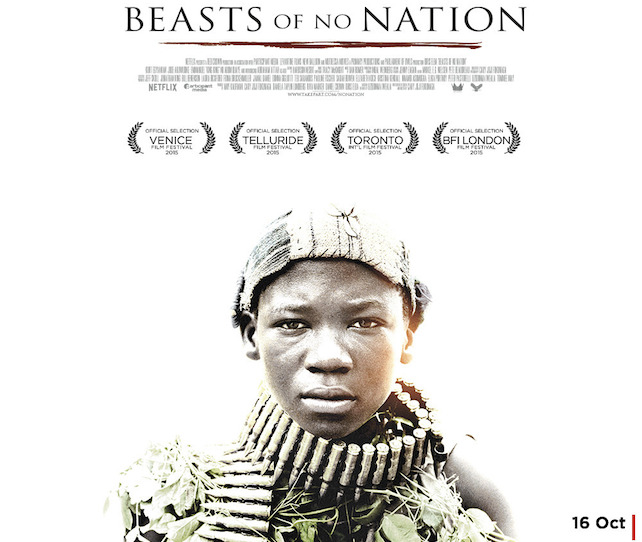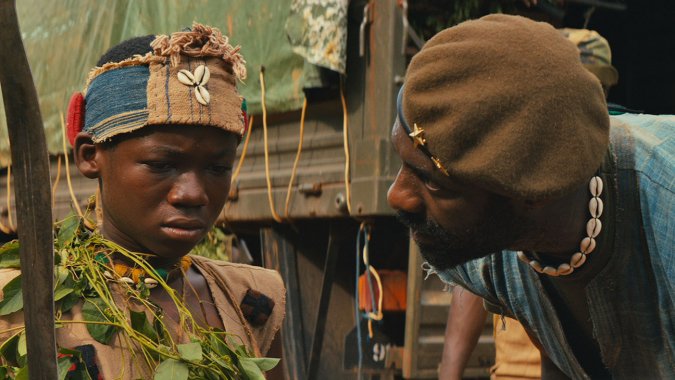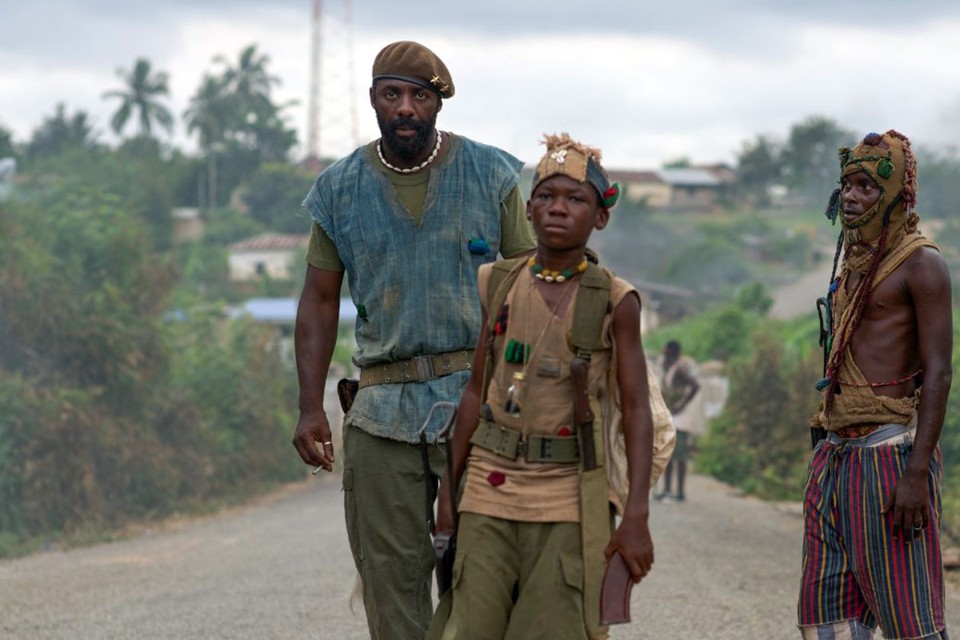For the vast majority of Beasts Of No Nation’s two hours and sixteen minutes there’s no break from its bleak and horrific imagery, but that’s of course the whole point. The dehumanizing trauma that child soldiers endure in the real world are no laughing matter, and so writer and director Cary Joi Fukunaga (of True Detective fame) puts together his adaption of Uzodinma Iweala’s novel with a good amount of gravity and attention to detail. It’s a very stylish looking film, but outside of a couple of scenes where protagonist Agu (Abraham Attah) goes through a hallucination, it’s mainly meant to emphasize stark realism.
Agu is a young boy living in an unspecified region of West Africa, enjoying a fairly average lifestyle before the buffer zone around his village is breached in an ongoing conflict between a vaguely defined government force, and the rebel army opposing them. The silly moments he has with his brother are the last moments of levity he’ll experience for a while, as soon he’s separated from his mother during the evacuation.
When his father and brother are gunned down by enemy forces, leading Agu to escape into the jungle, he’s greeted by a rebel faction led by a Fagin-esque sergeant named Commandant (Idris Elba). He recruits new soldiers basically by taking advantage of their fear and stripping away their identity, as he does with the terrified Agu. Promising safety and a sense of purpose, Commandant gradually manipulates the boy into doing his bidding, who in turn starts to bound with the other soldiers, notably a mute but loyal soldier named Strika. Strangely enough, it’s the affection he begins to receive from his new family that helps Agu cope as they commit increasingly viler acts.
Even though the Commandant is taking orders from an at-first unseen figure known as Supreme Commander, their arc doesn’t do much to define the details of the war either (though it does do a good job in displaying Commandant’s insecurity). The story is purely through Agu’s perspective, so the details and background of the conflict are kept purposely vague. Narrating at various points in the film, he feels he has no choice but to continue fighting in order to survive. As it’s meant to be a study on gradual loss of innocence and not a political statement in particular, the audience is given as many plot details as it needs.
Fukunaga isn’t afraid to scare the viewer, so the violence is quite graphic but it doesn’t ever feel exploitative. As unflinching as Beasts can get, it’s shot and stylized very artfully- we’re meant to recoil but also reflect on how the terror is affecting both its victims and its perpetrators. The child soldiers are coerced into their actions through bonding rituals, songs and battle chants, brown heroin and other various drugs meant to dull their senses and increase their tolerance for brutality, all complete with a shaman who helps Commandant indoctrinate the children into his cause.
Known as someone who’s great at playing villains anyway, Idris Elba makes Commandant into a disgusting, egotistical and intimidating figure, and yet also a pathetic one as the story progresses and he’s denied what he sees as his just reward. I get the impression he can’t function without people following him like a wolf pack, and his child army certainly functions as such. An unknown from Ghana, Abraham Attah’s first performance is a great debut for him, capturing Agu’s struggle to hold onto his humanity as the war begins to eat away at it. His actions are never once whitewashed, but due to his awful circumstances he of course remains a sympathetic figure.
Basically, Beasts Of No Nation is a terrifying but thoughtful story about someone trying to survive with little options, and what’s perhaps a futile attempt to return to normalcy afterwards. While it does tell a story rooted in reality that deserves more attention from the public at large, it’s mainly meant to be a character study, and for my money it’s a very effective and well directed one.



